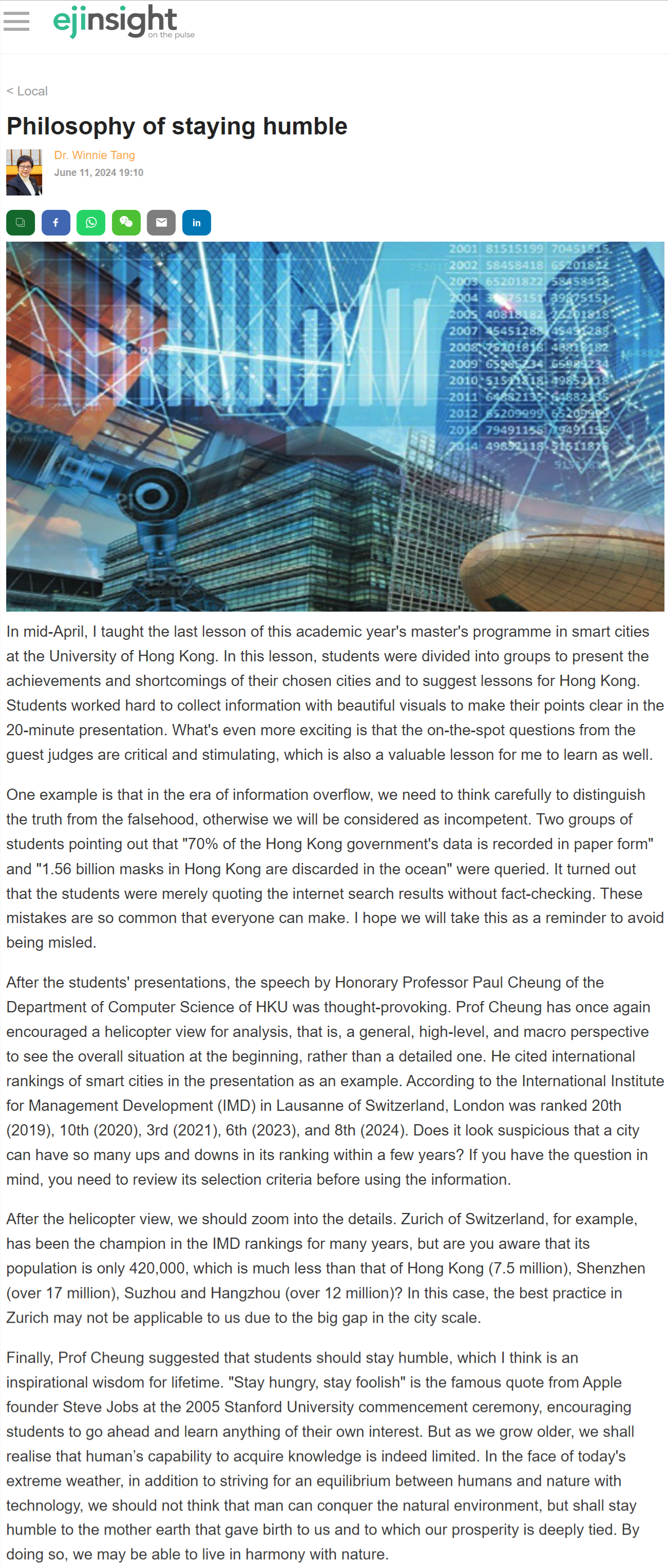網上版請按此

Philosophy of staying humble
In mid-April, I taught the last lesson of this academic year's master's programme in smart cities at the University of Hong Kong. In this lesson, students were divided into groups to present the achievements and shortcomings of their chosen cities and to suggest lessons for Hong Kong. Students worked hard to collect information with beautiful visuals to make their points clear in the 20-minute presentation. What's even more exciting is that the on-the-spot questions from the guest judges are critical and stimulating, which is also a valuable lesson for me to learn as well.
One example is that in the era of information overflow, we need to think carefully to distinguish the truth from the falsehood, otherwise we will be considered as incompetent. Two groups of students pointing out that "70% of the Hong Kong government's data is recorded in paper form" and "1.56 billion masks in Hong Kong are discarded in the ocean" were queried. It turned out that the students were merely quoting the internet search results without fact-checking. These mistakes are so common that everyone can make. I hope we will take this as a reminder to avoid being misled.
After the students' presentations, the speech by Honorary Professor Paul Cheung of the Department of Computer Science of HKU was thought-provoking. Prof Cheung has once again encouraged a helicopter view for analysis, that is, a general, high-level, and macro perspective to see the overall situation at the beginning, rather than a detailed one. He cited international rankings of smart cities in the presentation as an example. According to the International Institute for Management Development (IMD) in Lausanne of Switzerland, London was ranked 20th (2019), 10th (2020), 3rd (2021), 6th (2023), and 8th (2024). Does it look suspicious that a city can have so many ups and downs in its ranking within a few years? If you have the question in mind, you need to review its selection criteria before using the information.
After the helicopter view, we should zoom into the details. Zurich of Switzerland, for example, has been the champion in the IMD rankings for many years, but are you aware that its population is only 420,000, which is much less than that of Hong Kong (7.5 million), Shenzhen (over 17 million), Suzhou and Hangzhou (over 12 million)? In this case, the best practice in Zurich may not be applicable to us due to the big gap in the city scale.
Finally, Prof Cheung suggested that students should stay humble, which I think is an inspirational wisdom for lifetime. "Stay hungry, stay foolish" is the famous quote from Apple founder Steve Jobs at the 2005 Stanford University commencement ceremony, encouraging students to go ahead and learn anything of their own interest. But as we grow older, we shall realise that human's capability to acquire knowledge is indeed limited. In the face of today's extreme weather, in addition to striving for an equilibrium between humans and nature with technology, we should not think that man can conquer the natural environment, but shall stay humble to the mother earth that gave birth to us and to which our prosperity is deeply tied. By doing so, we may be able to live in harmony with nature.
Dr. Winnie Tang
Adjunct Professor, Department of Computer Science, Faculty of Engineering; Department of Geography, Faculty of Social Sciences; and Faculty of Architecture, The University of Hong Kong